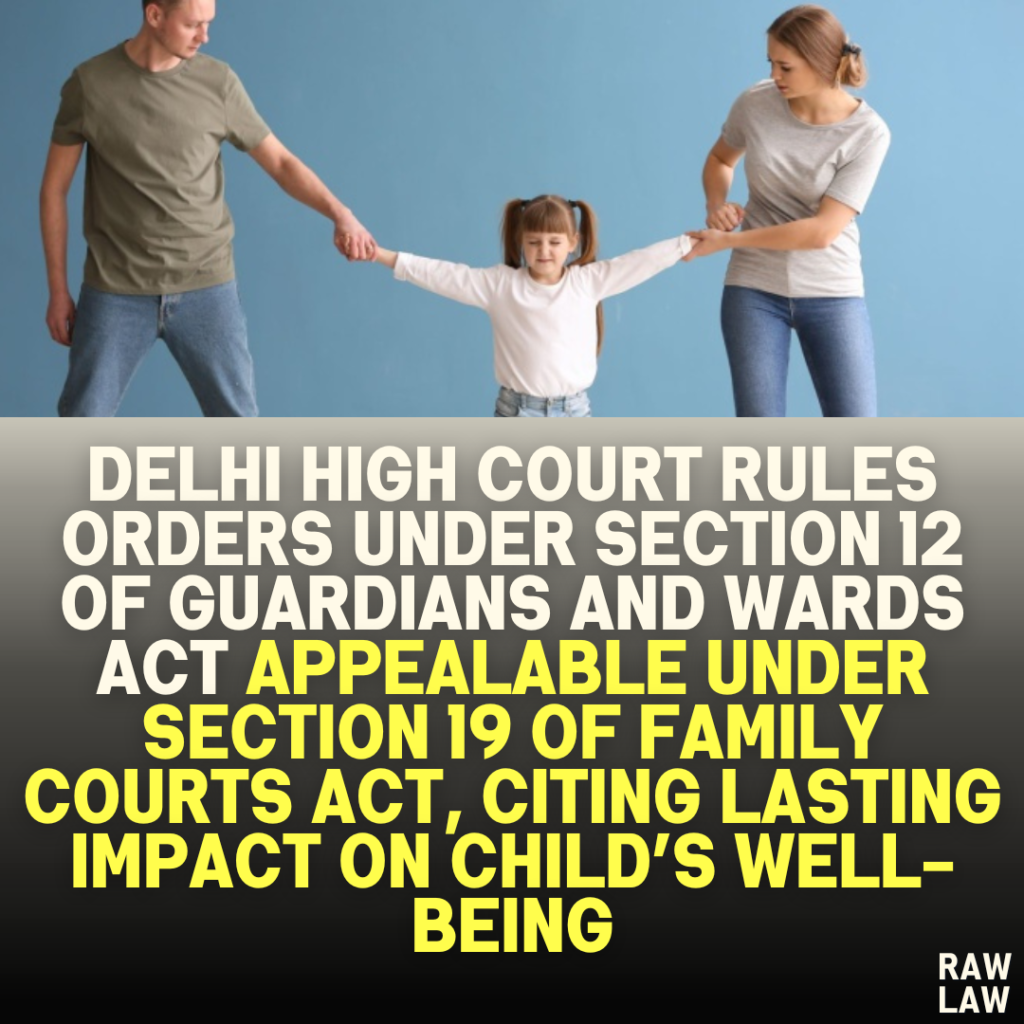Court’s Decision:
The Delhi High Court held that an order passed under Section 12 of the Guardians and Wards Act, 1890 (GW Act), which deals with interim custody and visitation of a minor, is appealable under Section 19(1) of the Family Courts Act, 1984 (FC Act). The court overruled the decision in Col Ramesh Pal Singh vs. Sugandhi Aggarwal, stating that such orders, though labeled “interlocutory” under the GW Act, cannot be treated as purely procedural and should be appealable as they touch upon substantive rights.
Facts:
The appeal arose from a decision by the Family Court granting the respondent father the right to pick up the child from the appellant mother’s house before school and drop her off after school, with the condition that the child would be in his temporary custody during the day when the mother was at work. The appellant challenged the order, arguing that since the child was already enrolled in a reputed school, this arrangement was unnecessary and sought to set it aside.
Issues:
The key legal question was whether an order passed under Section 12 of the GW Act regarding interim custody and visitation could be treated as an “interlocutory” order, thereby barring an appeal under Section 19(1) of the FC Act.
Petitioner’s Arguments:
The appellant contended that the impugned order, which granted the respondent temporary custody of the child, was not merely an interlocutory order, but an order affecting substantive rights. Relying on the Shah Babulal Khimji v. Jayaben D. Kania decision, the appellant argued that orders impacting the day-to-day well-being of the child could not be treated as procedural.
Respondent’s Arguments:
The respondent countered that the impugned order was purely interlocutory in nature, as defined under Section 12 of the GW Act, and thus, not appealable. The respondent relied on the previous judgment in Col Ramesh Pal Singh v. Sugandhi Aggarwal, which held that orders passed under Section 12 were interlocutory and therefore not appealable.
Analysis of the Law:
The court analyzed the provisions of Section 12 of the GW Act and Section 19(1) of the FC Act. It observed that while Section 12 refers to orders regarding the temporary custody and protection of minors as interlocutory, the FC Act does not define “interlocutory” explicitly. The court emphasized that orders affecting the welfare and day-to-day existence of a child should not be treated as mere procedural orders.
Precedent Analysis:
The court distinguished the case from Col Ramesh Pal Singh, stating that the reliance on the interlocutory nature of orders under the GW Act was misplaced. The court favored the interpretation in Shah Babulal Khimji, which allowed for appeals when interim orders affected substantive rights.
Court’s Reasoning:
The court reasoned that an order affecting the rights and welfare of a child could not be considered interlocutory in the same sense as procedural orders. It noted that such orders could have lasting and irreparable consequences on the child’s psychological and physical well-being, and the time lost due to such arrangements could not be restored.
Conclusion:
The Delhi High Court held that the decision in Col Ramesh Pal Singh did not lay down the correct law, and orders under Section 12 of the GW Act, which impact the welfare and custody of a child, are appealable under Section 19(1) of the FC Act.
Implications:
This judgment clarifies that orders involving interim custody or visitation of minors are not to be treated as purely interlocutory and are appealable under the FC Act. This ruling is likely to impact ongoing and future custody disputes, providing a broader avenue for appeal in cases involving the welfare of minors.
